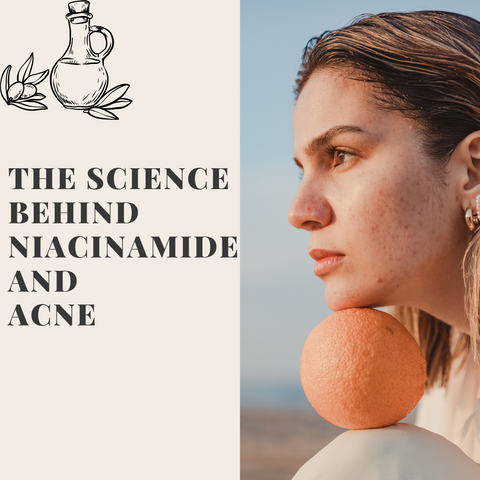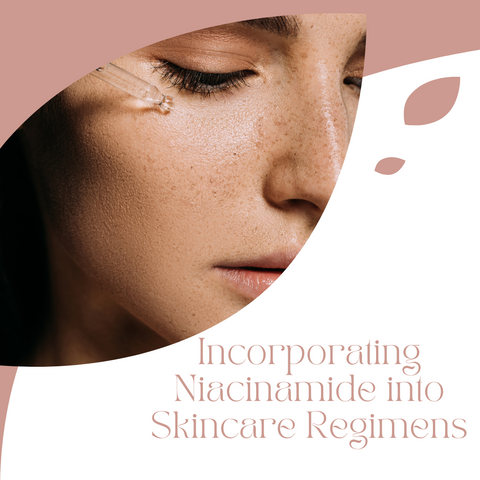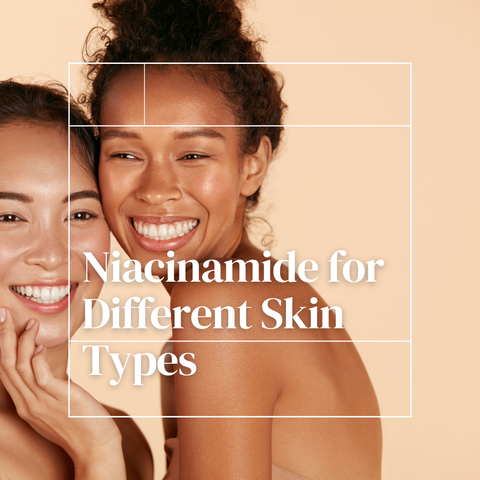Niacinamide, also known as vitamin B3 or nicotinamide, has received a lot of attention in the cosmetics world, notably in the treatment of acne. Its diverse qualities make it an important part of acne treatment. This blog provides a thorough examination of niacinamide's involvement in acne control.
The Science Behind Niacinamide and Acne

The effectiveness of niacinamide in treating acne stems from its diverse impacts on the different variables that contribute to acne formation. The mechanisms that niacinamide uses to treat acne include sebum regulation, anti-inflammatory properties, pore size reduction, enhanced skin barrier function, antibacterial effects, reduction of hyperpigmentation, oil control without drying out the skin, and combination therapy. Individual reactions to skincare chemicals, however, can vary, and while niacinamide is generally well tolerated, some people may have mild discomfort or allergy.
Understanding How Niacinamide Works on Acne
Niacinamide, a kind of vitamin B3, treats acne by addressing many variables that contribute to its development. Here's a breakdown of how niacinamide works specifically in acne management, including sebum regulation, anti-inflammatory properties, pore size reduction, skin barrier function enhancement, antibacterial effects, hyperpigmentation reduction, oil control without overdrying, and complementary treatment. Its multiple activities make it an important component of acne-prone skin hygiene programmes.
Benefits of Niacinamide for Acne-Prone Skin
Niacinamide has a number of advantages that are especially designed to meet the needs of skin that is prone to acne. The following are the main benefits of niacinamide use in acne management:
-
Sebum Regulation: Niacinamide aids in controlling the skin's production of sebum. Excessive sebum production can clog pores and aggravate acne. By balancing sebum levels, niacinamide reduces the likelihood of pore blockages, preventing the formation of acne lesions.
-
Anti-Inflammatory Properties: Acne is defined by inflammation, which causes redness, swelling, and discomfort. Niacinamide has anti-inflammatory effects that can help relieve irritated skin. It inhibits the formation of inflammatory chemicals, which calms active acne lesions and lessens their intensity.
-
Pore Size Reduction: Acne is caused by clogged pores that collect debris, oil, and dead skin cells. Niacinamide has been demonstrated to constrict pores and make them less prone to clogging. This reduction in pore size aids in the prevention of future acne breakouts.
-
Enhancement of Skin Barrier Function: Niacinamide stimulates the synthesis of ceramides, which are important components of the skin barrier. A stronger skin barrier is less prone to inflammation and more resistant to external irritants, lowering the risk of exacerbating acne-prone skin.
-
Antibacterial Effects: While niacinamide is not a powerful antibacterial agent, it does have modest antimicrobial effects. It can help prevent fresh acne breakouts by inhibiting the growth of acne-causing bacteria such as Propionibacterium acnes.
-
Reduction in Hyperpigmentation: Acne breakouts are frequently followed by post-inflammatory hyperpigmentation (PIH), which results in dark patches. Niacinamide reduces the visibility of acne scars by preventing melanin transfer and promotes a more even skin tone.
-
Balanced Oil Control: Unlike aggressive acne treatments that cause excessive skin dryness, niacinamide regulates sebum production without producing excessive skin dryness. This equilibrium is critical for acne management while also keeping proper skin hydration.
-
Compatibility with Other Treatments: Niacinamide is generally well tolerated and can be easily included into skincare regimes alongside other acne treatments like retinoids, salicylic acid, or benzoyl peroxide. It enhances the efficacy of these therapies while minimising any negative effects such as irritation or dryness.
-
Suitable for Sensitive Skin: Niacinamide is known for its gentle nature and is suitable for various skin types, including sensitive and acne-prone skin. It is less likely to cause irritation, making it a suitable option for those with sensitivity issues.Top of Form
Niacinamide’s Anti-Inflammatory and Healing Properties
Niacinamide, also known as nicotinamide or vitamin B3, has powerful anti-inflammatory and healing qualities, which contribute to its efficacy in skincare and wound healing. Here's a look at some of these benefits, including anti-inflammatory effects, barrier function augmentation, wound healing assistance, skin hyperpigmentation reduction, calming sensitivity, and UV protection. The anti-inflammatory and healing qualities of niacinamide make it a desirable ingredient in skincare formulations aimed at lowering inflammation, increasing wound healing, and improving general skin health. Its mild nature and compatibility with different skin types make it a popular skincare choice.
Incorporating Niacinamide into Skincare Regimens

Incorporating niacinamide into your skincare routine can provide numerous benefits, particularly for acne management and overall skin health. Here's how to incorporate niacinamide into your skincare routine step by step:
-
Assess Your Skin's Needs: Consider your skin type and concerns. Niacinamide is generally safe for most skin types, including sensitive and acne-prone skin. It treats a variety of issues, including acne, uneven skin tone, and enlarged pores.
-
Selecting the Right Products: Look for niacinamide-containing skincare products. It comes in a variety of forms, including serums, creams, lotions, and toners. Choose products with a niacinamide concentration ranging from 2% to 5%, which is effective without causing irritation.
-
Start slowly: If this is your first time using niacinamide, start with a lower concentration product to ensure your skin tolerates it well. Begin by using it only a few times per week to give your skin time to adjust.
-
Cleanse Your Face: Before using any skincare product, thoroughly cleanse your face to remove dirt, oil, and makeup. This ensures better absorption of niacinamide into the skin.
-
Apply Niacinamide Product: After washing your face, dab on a little bit of niacinamide-containing product. Apply it to your skin gently, paying special attention to areas that are prone to acne or issues like uneven skin tone.
-
Layering Order: Apply niacinamide after lighter serums but before heavier creams or oils if you are using multiple skincare products. For information on specific layering techniques, consult a dermatologist or refer to the product's instructions.
-
Sun Protection: It is a good idea to include niacinamide in your morning routine. But make sure to apply sunscreen during the day afterward. Niacinamide by itself does not photosensitize, but UV protection is essential for maintaining the health of your skin overall.
-
Monitor Results: Give your skin some time to adjust and observe the effects of niacinamide over several weeks. It may take a few weeks to notice significant improvements in acne, skin texture, or tone.
-
Consistency is Key: For optimal results, consistency in your skincare routine is essential. Use niacinamide regularly as part of your daily regimen to experience its full benefits.
-
Consider Complementary Products: Niacinamide can be combined with other beneficial skincare ingredients such as hyaluronic acid, vitamin C, or retinoids. However, it's essential to patch-test new products and ensure compatibility to prevent any adverse reactions.
Remember that individual skin reactions might vary, so perform a patch test before using niacinamide or any new skincare product on your face. If you have specific skin issues or conditions, a dermatologist can provide tailored advice for efficiently incorporating niacinamide into your skincare routine.
Choosing the Right Niacinamide Products
Consider several aspects when choosing niacinamide products for your skincare routine to guarantee you purchase the proper ones for your skin's needs. Here's a checklist of things to consider when shopping for niacinamide skincare products, including the ingredients list, product type, skin type compatibility, additional ingredients, packaging and stability, reviews and recommendations, patch test, brand reputation and quality, price point, and dermatologist recommendations. It may take some trial and error to locate the niacinamide product that works best for your skin and offers the results you want. Patience and consistency in using the product as suggested will assist you in determining its effectiveness over time.
Optimal Concentrations for Acne Treatment
The ideal niacinamide concentration for treating acne varies based on individual skin sensitivity and product composition. However, niacinamide doses ranging from 2% to 5% are routinely utilised in acne treatment skincare products and are generally well tolerated by most skin types. Here's a breakdown of the best niacinamide concentrations for acne treatment: 2% Niacinamide, 3-4% Niacinamide, and 5% Niacinamide. While higher concentrations may theoretically provide more efficacy, it is critical to consider individual skin tolerance and the probability of irritation or sensitivity, particularly for sensitive or highly irritated skin types.
It's also worth noting that niacinamide is frequently used in conjunction with other active chemicals to treat acne, such as salicylic acid, retinoids, or benzoyl peroxide, for a synergistic effect. These combinations can be useful, but they may exacerbate skin sensitivity, so it's critical to introduce new items gradually and monitor your skin's reaction. When selecting a niacinamide acne treatment solution, consider not just the concentration but also the overall composition and the presence of supporting components that can boost its effectiveness in treating acne and improving overall skin health. A dermatologist can make customised advice based on your skin's unique needs and sensitivity.
Layering Skincare with Niacinamide
Layering niacinamide-containing skincare products requires strategic application to ensure optimal absorption and effectiveness. Niacinamide is a versatile ingredient that works well with a variety of products; however, proper layering is required for maximum benefits. Here's how to layer niacinamide-containing skincare products:
-
Cleansing: Begin your routine by cleansing your skin with a gentle cleanser to remove dirt, oil, and impurities. This helps your skin absorb subsequent products more effectively.
-
Toning (if necessary): Use a toner if it is part of your routine. Toners can help balance the pH of the skin and prepare it for better product absorption.
-
Niacinamide Serum or Essence: Put on your niacinamide serum or essence. This stage enables the niacinamide to address issues such as acne, irritation, pore size, and uneven skin tone. Allow the product to absorb completely by gently patting or massaging it into your skin.
-
Additional Serums (if using): If you use other targeted serums (for example, hyaluronic acid for hydration or vitamin C for brightening), apply them after the niacinamide serum, allowing each component to absorb before movin
-
Moisturizer: After that, apply a moisturiser to trap in moisture and offer hydration. This is especially important if you're using acne-fighting treatments that may be drying.
-
Sunscreen (Daytime Routine): Finish your morning ritual with sunscreen. Niacinamide is not a photosensitizer, but it is necessary to protect your skin from UV damage, especially if you are dealing with hyperpigmentation or acne scarring.
Key Points to Consider:
-
Order of Application: Apply niacinamide-containing products earlier in your routine, after cleansing. This allows better absorption and effectiveness.
-
Wait Time: Allow a few moments for each product to absorb before applying the next. This helps to prevent pilling and ensures that each product works properly.
-
Product Compatibility: Niacinamide is generally compatible with a wide range of skincare ingredients. However, avoid using it in the same routine as products with extremely low pH (such as acids), as this may reduce its efficacy.
-
Consistency: Using niacinamide consistently in your routine can produce better results over time. Results might not be immediate, so patience is key.
-
Patch Test: When introducing new products or combining multiple active ingredients, patch tests should be performed to ensure compatibility and reduce the risk of irritation or adverse reactions.
Always pay attention to your skin and adapt your routine based on how it reacts to different products. If you have specific concerns or questions, a dermatologist can provide personalised advice on how to incorporate niacinamide into your skincare regimen for the best outcomes.
Niacinamide for Different Skin Types

Niacinamide is a versatile skincare ingredient that is suitable for all skin types due to its gentle and effective properties. The following is a breakdown of how niacinamide benefits various skin types:
-
Oily Skin: Niacinamide regulates sebum production, reducing excess oiliness without overdrying the skin. It also reduces the appearance of enlarged pores, making it ideal for acne-prone oily skin.
-
Dry Skin: Niacinamide strengthens the skin barrier, promoting moisture retention and preventing water loss. It improves the skin's ability to retain moisture, making it ideal for dry and dehydrated skin.
-
Combination Skin: Because of its balancing properties, niacinamide is ideal for combination skin. It promotes a more balanced complexion by regulating sebum production in oily areas while maintaining hydration in drier areas.
-
Sensitive Skin: Niacinamide's gentle nature makes it suitable for sensitive skin. It has anti-inflammatory properties that help to calm and soothe irritation, reducing the likelihood of sensitivity or redness.
-
Acne-Prone Skin: Niacinamide is effective for acne-prone skin due to its sebum-regulating and anti-inflammatory properties. It reduces acne-related inflammation and the appearance of blemishes by controlling oil production.
-
Ageing or Mature Skin: Niacinamide strengthens the skin barrier, increases collagen production, and aids in the fading of hyperpigmentation, making it useful for addressing fine lines, wrinkles, and age spots. It improves the overall texture and tone of the skin.
Niacinamide for Oily and Sensitive Skin
Niacinamide is a beneficial ingredient for oily and sensitive skin types due to its gentle yet effective properties. Here's how niacinamide can benefit these specific skin types:
-
Oily Skin:
-
Sebum Regulation: Niacinamide helps regulate sebum production without causing excessive dryness. For oily skin types, this is particularly beneficial as it reduces excess oiliness, minimizes shine, and helps prevent clogged pores that can lead to acne breakouts.
-
Pore Minimization: It can reduce the appearance of enlarged pores, which are common in oily skin. Niacinamide's ability to tighten pores can result in a smoother skin texture and less visible pores.
-
Acne Management: Oily skin is often more prone to acne. Niacinamide's anti-inflammatory properties help in calming inflammation associated with acne lesions, reducing redness, and contributing to the overall management of acne.
-
Lightweight Formulations: Look for niacinamide in lightweight formulations like serums or gels, which absorb quickly into the skin without adding extra oiliness.
2. Sensitive Skin:
-
Gentle and Soothing: Niacinamide is generally well-tolerated by sensitive skin types due to its gentle nature. It has anti-inflammatory properties that can help soothe and calm irritation or redness.
-
Barrier Enhancement: It reinforces the skin barrier, which is often compromised in sensitive skin. This strengthening of the skin barrier helps reduce sensitivity and makes the skin less susceptible to external irritants.
-
Minimal Risk of Irritation: Compared to some other active ingredients, niacinamide has a lower risk of causing irritation or adverse reactions in sensitive skin types.
If you have any concerns about using niacinamide or if you have any specific skin disorders, a dermatologist can provide personalised suggestions and help on incorporating niacinamide into your skincare regimen for optimal results without creating irritation or worsening sensitivity.
Addressing Adult Acne with Niacinamide
Niacinamide, because of its multiple qualities that target different variables that contribute to acne formation, can be an effective component in treating adult acne. sebum regulation, anti-inflammatory effects, pore minimization, reduction in post-inflammatory hyperpigmentation (PIH), supports skin barrier, and gentle and well-tolerated are some of the ways niacinamide can help manage adult acne. If you have persistent or severe adult acne, you should see a dermatologist for a thorough evaluation and personalised treatment plan that may include niacinamide as well as other appropriate medicines for your unique skin condition.
Preventing Acne Scars and Pore Minimization
Acne scar prevention and pore reduction require a combination of skincare practises, lifestyle changes, and maybe expert treatments. Gentle Cleansing, Exfoliation, Moisturise, Sun Protection, and Spot Treatment are some methods to help avoid acne scars and lessen the appearance of pores. By introducing niacinamide into your skincare routine and combining it with other relevant treatments, you may avoid acne scars and minimise the appearance of pores, resulting in clearer and smoother skin over time.
Long-term Benefits and Considerations

When used consistently over time, niacinamide has various long-term benefits for skin health. Among these advantages and considerations are:
-
Overall Skin Health Improvement: Regular use of niacinamide can result in improved skin texture, reduced inflammation, and more even skin tone. It strengthens the skin barrier, making it more resistant to environmental stressors.
-
Sebum Regulation: Niacinamide aids in the control of sebum production, which has long-term advantages for skin that is oily or prone to acne. It lessens the chance of clogged pores and acne breakouts by managing excess oil.
-
Hyperpigmentation: Niacinamide can help fade dark spots and post-inflammatory hyperpigmentation (PIH) caused by acne or other skin conditions over time. It inhibits melanin transfer, promoting a more uniform skin tone.
-
Pore Size Reduction: Ongoing use of niacinamide may contribute to the tightening of enlarged pores, resulting in smoother skin texture and a reduced appearance of pores over time.
-
Anti-Aging Properties: Niacinamide promotes collagen production and skin elasticity. This can lead to improvements in fine lines and wrinkles over time, contributing to a more youthful appearance.
-
Mild and Well-Tolerated: Niacinamide is generally well-tolerated by most skin types, including sensitive skin, which means that many people can use it for an extended period of time without experiencing irritation or negative side effects.
-
Stable Ingredient: Niacinamide can hold its effectiveness in skincare formulations for a long time because it is comparatively stable and less likely to break down when exposed to light or air.
There are several long-term advantages to using niacinamide as part of a regular, comprehensive skincare routine, including healthier, clearer, and more radiant skin.
Sustained Use of Niacinamide for Lasting Results
Sustained usage of niacinamide in your skincare routine can result in long-term improvements and ongoing skin benefits. Consistency is essential for reaping the full benefits of this substance over time. Here's how regular use can lead to long-term benefits like regulated sebum production, enhanced skin barrier function, hyperpigmentation reduction, pore refinement, anti-aging benefits, and consistency in outcomes. By introducing niacinamide into your skincare routine on a regular basis and being patient with its effects, you may expect to see long-term improvements in the overall health and appearance of your skin.
Combining Niacinamide with Other Acne Treatments
Niacinamide interacts effectively with other acne-fighting agents and can enhance their benefits. Some common acne treatments and how they can be combined with niacinamide include Benzoyl Peroxide, Salicylic Acid, Retinoids (Retinol, Retin-A, Tretinoin), Alpha Hydroxy Acids (AHAs), Beta Hydroxy Acids (BHAs), and Azelaic Acid. When combined with other acne treatments, niacinamide can provide a well-rounded approach to acne management, addressing various facets of its development while maintaining skin health and minimising potential discomfort.
















